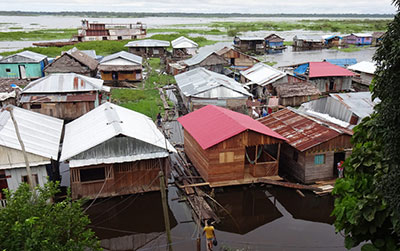Oral diseases are among the most prevalent non-communicable diseases worldwide, disproportionally affecting vulnerable populations. Oral diseases manifest as pain, impairment, and loss of function, and can affect individuals throughout their lifetime. Our study published in Annals of Global Health entitled “An Assessment of Pediatric Dental Caries and Family Quality of Life in an Informal Amazonian Community” examines the associations between child dental health status (DHS) and child and family quality of life in the community of Claverito, on the outskirts of Iquitos, Peru.

Untreated dental caries in permanent teeth is the most prevalent disease, and dental caries of the primary teeth affect more than 530 million children. Oral diseases manifest as pain, impairment, and loss of function, and can affect individuals throughout their lifetime. At the most extreme end of the socioeconomic spectrum, growing populations of marginalized individuals worldwide reside in slums. Claverito, is a community in the Peruvian Amazonian rainforest, and due to lack of housing has resulted in floating structures built on the Amazon River. Unfortunately, due to such precarious housing and poor environmental conditions, residents experience chronic illnesses, vector borne and infectious diseases, exposure to severe storms and flooding, and lack of water, sanitary infrastructure, and access to food.

In 2017, a collaborative group from the University of Washington (UW) schools and departments of Dentistry, Civil and Environmental Engineering, Environmental and Occupational Health, Global Health, Landscape Architecture, Neurology, and Nursing teamed up with the Centro de Investigaciones Tecnológicas Biomédicas y Medioambientales (CITBM), the Universidad Nacional de la Amazonía Peruana (UNAP) and the Instituto Nacional de Salud (INS) in Peru and developed a transdisciplinary action research program, InterACTION Labs, to design and implement research projects aimed at advancing the health, community strength, and future development of residents of one of these informal river communities – the Community of Claverito. As a contributor to InterACTION Labs, dental faculty collected information about the community’s oral health status and the impact of oral health on the residents’ quality of life. The purpose of this study was twofold: 1) to describe the prevalence and distribution of dental caries among the pediatric and caregiver populations of a slum community located on the Amazon River in Claverito, Peru; and 2) to evaluate the relationships between the children’s dental health status and their oral health related quality of life (OHRQoL) of the children and the impact of the child’s condition on the family.
Children and their caregivers living in the Community of Claverito exhibited high levels of dental caries. Children’s untreated dental caries were associated with both family’s quality of life and caregivers’ untreated dental caries. Further research is needed on how improving availability and access to oral health services have the potential to benefit the health of residents of informal communities like the one of Claverito.
